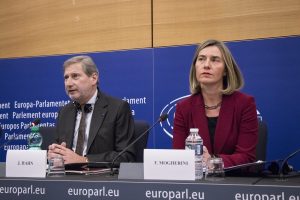Western Balkans Strategy: Finally Getting Serious?
Future Europe 13 February 2018The enlargement process is deeply linked with the Future of Europe process. The High Representative Federica Mogherini stated in Strasbourg: “Anchoring the Balkans to a perspective of EU accession is in the interest of the EU”. Then she added: “The months ahead will be intense, will be ambitious, will be — hopefully — months of a turning point that will be remembered in the history, I believe, of the European Union”.
The Strategy clears the point out by declaring that: “This firm, merit–based prospect of EU membership for the Western Balkans is in the Union’s very own political, security and economic interest. It is a geostrategic investment in a stable, strong and united Europe based on common values”.
Among the reasons why the EU has a political interest in enabling the region to access the EU, Moscow influence is definitely a top one. Putin has indeed encouraged the Western Balkans not to get closer to the EU, with the same approach that he has used towards other EU neighbours. And any longer await would have boosted Moscow possibility to convince the Western Balkans. In fact, the Russian and Chinese influence in the region has grown, while the American one has declined, so far that the soft power of the EU needed a push to regain its impact. As Antonio Tajani, President of the EP, tweeted: “The Western Balkans are a part of Europe and we should give them a European perspective for the prosperity and stability of the region. I am optimistic and I believe countries like Serbia and Montenegro can join by 2025”.

© http://europa.ba
Furthermore, the Balkan barometer showed that, in 2017, the enthusiasm among the Western Balkan countries for the EU accession process was fading. Not a reason for forcing the process, according to Enlargement Commissioner Johannes Hahn, who told in a press conference that since “75% of the business of the region is done with the EU”, implying that the market integration is already happening, it is crucial that the membership with the EU stays grounded on “the commitment to the European values”.
The state of play
At the moment, only Croatia joined the European Union, while all the six concerned countries (Albania, Bosnia and Herzegovina, Kosovo, Macedonia, Montenegro and Serbia) obtained the visa–free travel and the stabilisation and association agreements (SAA) with the EU. Montenegro and Serbia are negotiating multiple chapter of the EU acquis and could be ready to join the bloc in 2025, but not earlier. They are considered to be the frontrunners of the bloc. And mentioning a specific year is a powerful incentive for the region’s politicians to work to meet soon the criteria for membership.
Nonetheless, some trends are a common hurdle for all the the six countries. These are: the erosion of democracy; the weak rule of law and media freedom; the slack economic performance, the fast–rising nationalist sentiments and the external influences. To successfully overcome these issues, the EU announced six flagship initiatives to support transformation efforts in the region. “Accession remains a merit–based process fully dependent on the objective progress achieved by each country”, said Commissioner Hahn. President Jean-Claude Juncker announced that he will travel to each country of the Western Balkans at the end of this month with a clear message: “Keep reforming and we will keep supporting your European future.”
The strategy of the Commission has indeed proposed bold measures. Particularly important are: the progressive opening of EU funds, the inclusion of the Balkan six governments in EU policy–making processes even before membership, the lift of visible and invisible barriers for trade and travel. These incentives for the reforms now need to be matched by clear standards for the region’s governments to work towards.
Exporting stability or importing instability
In the aftermath of the Arab Spring, the EU learned that it either export stability, or it will find itself faced with importing instability from abroad. The latter is, of course, a beneficial situation for the EU competitors only. A sound reason for encouraging the Western Balkan countries and for making a joint effort to improve the stability of those democracies. But also a fundamental starting point for the EU not to limit its Future of Europe reflection and reforms to its internal dynamics, but to consistently connect them with its external dimension.
Whilst the EU seems to be very cautious over a stronger connection of its two dimensions in official documents, the facts tell us a different story. Over the last months, we observed an historical leap in PESCO, a long–awaited decision over the enlargement process and, on the other hand, the introduction of a pillar for social rights. Therefore, we could reasonably expect the Institutions to softly start acting, intertwining the internal and external dynamics, just as the current multipolar framework of the international relations requires.



